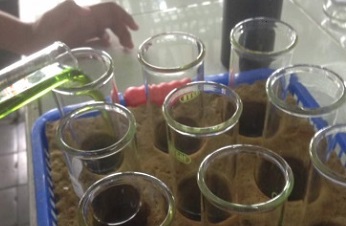In the Hands of IPB’s Students, Dragon Fruit Waste become Fungicide

Today many consumers are paying more attention to the side effects of the many synthetic materials in the various aspects of life. Food, beverages, cosmetics and so forth are only few of the many industrial products that use synthetic materials in their manufacture. But now the industry is competing to attract consumers to become their market segment by developing natural products.
Seeing this, Bogor Agricultural University students (IPB) create a fungicide research program through the Research Student Creativity Program (PKM-P) held by the Ministry of Research, Technology and Higher Education Republic of Indonesia (Kemenristekdikti RI) every year.
Inspired by the popularity of dragon fruit in Indonesia, where a lot of dragon-based products then produce abundant organic waste, "we see that every single dragon fruit tree can produce one kilogram of unproductive tendrils that need to be cut and discarded," Akbar said as group leader.
Dragon fruit (Hylocereus sp.) is a cactus plant originating from Mexico and America. This plant is widely cultivated in Indonesia especially the red fleshy dragon fruit (Hylocereus polyrhizus and Hylocereus costaricensis) and the white one (Hylocereusundantus). This fruit is widely cultivated in Java, Riau, Lampung and Lombok. Dragon fruit trees take a quite long time to grow and produce fruit after 10-12 months.
The research, conducted in IPB’s Plant Micropology Laboratory, utilizes dry leaves of dragon fruit then extracted by maseration method (soaking at room temperature with certain solvent), and after the right concentration is obtained, it will be tested against pathogenic fungi. The flavonoid compounds contained in the dragon fruit tendrils potentially inhibit the growth of parasitic fungi that are targeted in the extraction process.
PKM team consisting of Akbar Sukma Pratama, Gecci Dwi Prasetyo and Nuraini Firma Ardianti formed due to the similarity of campus organization hope that the waste generated from the dragon fruit garden can be utilized well as until now there has been no further processing of it – it is just wasted and stacked. The team also hopes that its research can become a source of information on natural fungicide. (Mtd)



